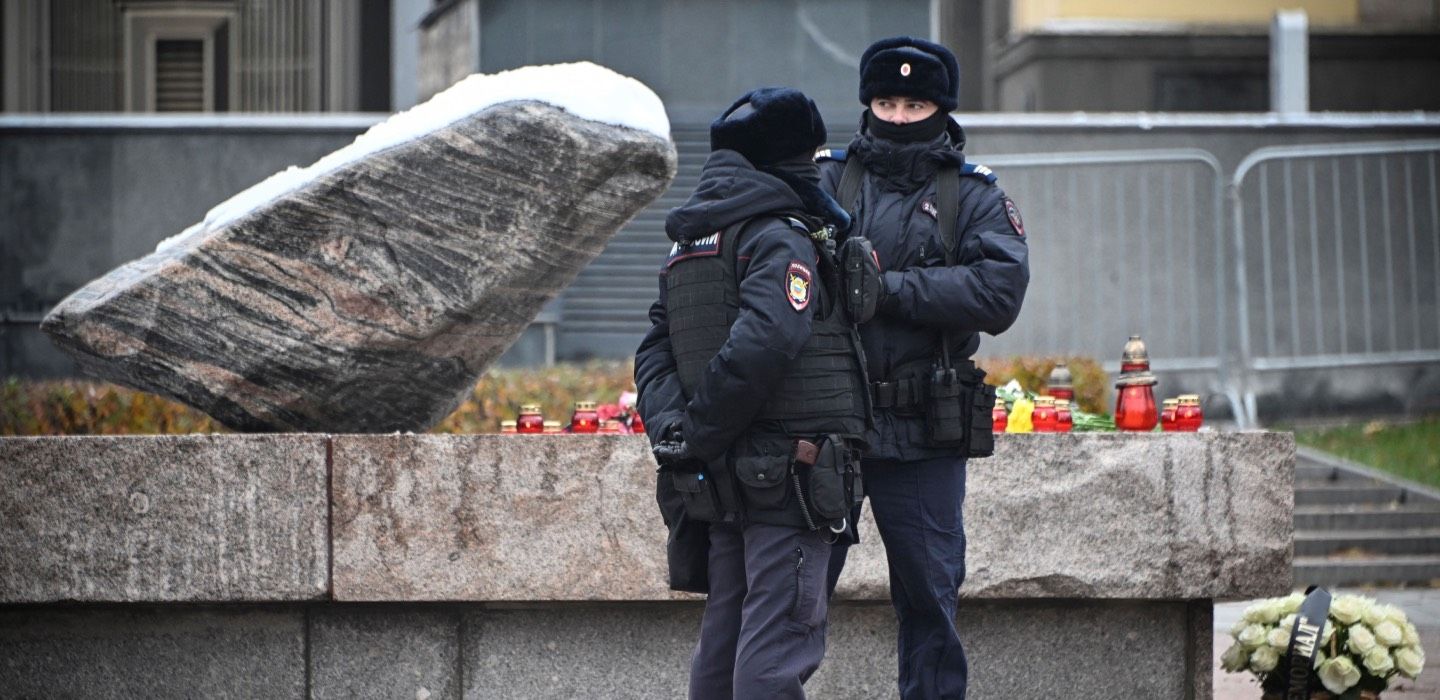The Russian army is not currently struggling to recruit new contract soldiers, though the number of people willing to go to war for money is dwindling.
Dmitry Kuznets
{
"authors": [
"Alexandra Prokopenko"
],
"type": "commentary",
"blog": "Carnegie Politika",
"centerAffiliationAll": "",
"centers": [
"Carnegie Endowment for International Peace",
"Carnegie Russia Eurasia Center"
],
"collections": [
"Politika: The Best of 2025"
],
"englishNewsletterAll": "",
"nonEnglishNewsletterAll": "",
"primaryCenter": "Carnegie Russia Eurasia Center",
"programAffiliation": "",
"programs": [],
"projects": [],
"regions": [
"Russia",
"Europe"
],
"topics": [
"EU",
"EU Foreign Policy",
"Foreign Policy",
"Economy",
"Security"
]
}
Source: Getty
International compliance and anti-money laundering standards are currently formulated in such a way that the Western financial system does not differentiate between Russian political prisoners and ISIS militants.
After nearly four years of waging war against Ukraine, the Kremlin has mastered and scaled up a new form of repression against its domestic opponents. It consists of using Rosfinmonitoring, the agency responsible for combating money laundering and terrorism financing, to label people “terrorists” and “extremists,” making normal financial life impossible for tens of thousands of people.
Being blacklisted not only means that all that person’s assets in Russia are frozen, it also triggers a chain reaction in the Western financial system. Banks start demanding additional documents for basic transactions, or they simply close the accounts, unwilling to deal with a “problem client.” Once a person has been tarred with this label by the Russian authorities, it’s extremely difficult and expensive to get rid of it—and all the costs are borne by the individual in question.
Before the war, Rosfinmonitoring’s list of terrorists primarily consisted of militants associated with Islamic fundamentalism. Later, it grew to include Alexei Navalny’s Anti-Corruption Foundation, the opposition leader himself (who has since died in a Russian jail), and his closest associates. Since Russia’s full-scale invasion of Ukraine in February 2022, the list has expanded at breakneck speed to include any critics of the Russian regime.
In the last couple of weeks alone, the politician Ilya Yashin, popular blogger Ilya Varlamov, culinary historian Pavel Syutkin, Russian Orthodox Church researcher Ksenia Luchenko, and political scientist Ekaterina Schulmann (the latter two of whom are regularly published by the Carnegie Russia Eurasia Center) have all been added to the list. It is growing by 250–300 people per month, and this new form of cross-border repression now affects several thousand people. And it looks like this is only the beginning.
When Rosfinmonitoring updates its list of terrorists and extremists, that information is automatically passed on to specialized companies that aggregate large amounts of data on individuals and companies for KYC/AML (know your customer/anti-money laundering) systems used by banks and other financial institutions around the world. The three pillars of this global market are Dow Jones Risk & Compliance, LexisNexis, and Refinitiv World-Check.
Their databases contain lists of sanctioned individuals and the types of sanctions they are subject to, politically exposed persons (PEPs), and adverse media (i.e., negative mentions in the media and official sources). This data is used by banks and other institutions when conducting due diligence before opening accounts, investment deals, mergers and acquisitions, and many other transactions.
That process is 95–99 percent automated. Algorithms scan news stories, court rulings, and government websites. When an individual or company’s status changes, the bank receives a notification that the client has been mentioned in the context of terrorism. Standard procedure is then to freeze transactions and request additional documents. Sometimes a person is able to clear their name, but more often than not, the bank chooses to terminate its dealings with the client.
After all, the industry’s guiding principle is “better safe than sorry.” Regulators issue steep fines to banks for missed risks: HSBC was fined $1.9 billion for failing to prevent money laundering by Mexican and Colombian drug cartels. But there are no penalties for false alerts or overly strict compliance. If in doubt, therefore, it’s easier for the bank to simply turn down the client rather than waste resources on investigations or maintain an expensive compliance department to look into such cases in person.
Russia’s list of terrorists and extremists began to grow particularly rapidly after the State Duma passed a law expanding the powers of Rosfinmonitoring in late 2024. The list of actions for which Russians can be designated as “extremists” now includes all types of political crimes, such as disseminating “false information” about the actions of the Russian army, displaying prohibited symbols, and threatening the territorial integrity of the Russian Federation.
By the end of 2024, Russia’s list of “terrorists and extremists” contained over 20,000 names, according to the human rights project OVD-Info. Clearly, given the dizzying rate at which the list is growing, not all of them are connected to the criminal underground or drug cartels.
In 2020, the authorities added 1,381 people to the list. In 2021, 1,774 were added. This year, that figure had reached 3,031 by mid-October: a monthly average of over three hundred people.
In addition, every tenth person designated a “terrorist” by Russian law enforcement is a minor. The proportion of people on the list aged under 18 began to increase in 2023, according to Novaya Gazeta Evropa. So far this year, 249 teenagers have been added to the list, eighty-one of whom were under sixteen at the time of their inclusion.
Russia isn’t the only country using international compliance rules as a means of political repression. Belarus has several such lists, totaling over 1,500 people. They include the entire payrolls of human rights organizations, media outlets, and trade unions.
Dmitry Navosha, the Belarusian co-founder of the media project Tribuna, recently lost an appeal in the UK over Dow Jones Risk & Compliance’s description of him as being on a terror list of the Belarusian KGB, with no context or alternative viewpoint given. The Information Commissioner’s Office (ICO) declined Navosha’s appeal against that description, saying that while it noted concerns about the Belarusian judicial system, the ICO is not entitled to challenge decisions made by Belarusian courts. From a legal perspective, the ICO and data providers are correct: they cannot be responsible for verifying the legitimacy of the allegations.
Similarly, in early November, Russian clients of the popular financial service Revolut who reside in Europe on long-term visas were informed that their accounts had been frozen. Revolut cited the 19th EU sanctions package for its actions, which prohibits credit institutions from providing payment or e-money services to Russians and Belarusians unless they hold a valid temporary or permanent residence permit in the EU, European Economic Area, or Switzerland, or are citizens of those countries.
Following the outbreak of war and the imposition of Western sanctions, many banks have opted to simply stop working with clients from Russia or of Russian origin, according to a Reuters report which surveyed people from a broad range of backgrounds, including students, a woman who has lived in Germany for twenty years, and two opposition activists. All of them have had their accounts closed or had difficulty opening a new one after February 2022, despite not being subject to sanctions themselves.
Banks cite various reasons, from sanctions to internal regulations. But behind all of this is an automatic change in a person’s risk profile in the KYC system. In the Western financial system, everyone on a terror list looks equally risky, whether they are a Russian political prisoner or an ISIS fighter.
Compliance and anti-money laundering standards are set by the Financial Action Task Force (FATF), an international organization. Authoritarian regimes can weaponize virtually all of its rules if they so choose. FATF Recommendation No. 6, for example, obliges countries to apply financial sanctions against terrorists designated as such by the UN Security Council (Resolutions 1267 and 1373). Countries must identify suspicious individuals and organizations themselves and then propose their inclusion on the terrorist list.
Recommendations 3 and 5 require countries to criminalize money laundering and the financing of terrorism and extremism. In practice, however, authorities in many countries—including Russia— abuse the vague definition of terrorism in their laws to bring terrorism charges against virtually anyone, often with no evidence.
Another popular tool is Recommendation No. 4, which calls for freezing assets. A mere suspicion is enough to freeze someone’s funds: no actual evidence is required. Once funds are frozen, the individual faces insurmountable barriers: courts don’t respond to appeals, and hearings aren’t scheduled for months. Even when the freezing period formally expires, banks are afraid to unfreeze accounts without official permission from the regulator.
The problem is that the FATF only checks how well procedures are working: i.e., whether a country is freezing accounts correctly and whether inspections are conducted on time. The organization does not assess whether the terrorism charges themselves are justified and whether there were legal grounds for the individual’s inclusion on the list. This technical blind spot leaves it wide open to abuse.
These problems aren’t just a result of the way anti-money laundering recommendations are drafted. Another factor is that data providers make money from the volume of data. The more risks contained in a database, the more valuable that product is for compliance.
Providers are legally protected: they don’t pass judgment, but merely aggregate information. In Navosha’s case, Dow Jones is technically correct—the Belarusian KGB did indeed designate him a terrorist. The fact that this persecution is politically motivated isn’t their problem. Companies certainly test and refine their own risk profiling methodologies, use AI tools, and work in local languages. But it is self-description, without external auditing or regulation.
As a result, banks prefer to reject entire categories of clients rather than deal with each case individually. This problem is known as global de-risking. According to World Bank estimates, it affected over 700 million people between 2015 and 2018, primarily in middle- and low-income countries. Despite a revision of FATF standards in 2023, the de-risking problem persists.
All the transaction costs resulting from being included on the list are borne by the individual. People who have fallen victim to political persecution must hire expensive lawyers to deal with banks in Europe and America, access data providers, and persuade them to update their risk profile. This can be the most costly aspect of being sanctioned in this way.
The lack of mechanisms for assessing the politicization of national terrorist lists is a global problem that will only grow. A temporary solution could be to systematize formal indicators of abuse. For example, if a country is adding 300 people to the list every month and 10 percent of them are minors, that’s a signal that its data should be treated with caution. It is entirely feasible for the FATF or independent observers to create lists of countries that are abusing the law.
Over time, other political regimes—including Western ones—may adopt the same tactics. After all, it’s hard to imagine another such convenient tool of political repression that allows authorities to remain within the international legal framework while simultaneously creating enormous problems for their political opponents, no matter where they are in the world.
Carnegie does not take institutional positions on public policy issues; the views represented herein are those of the author(s) and do not necessarily reflect the views of Carnegie, its staff, or its trustees.
The Russian army is not currently struggling to recruit new contract soldiers, though the number of people willing to go to war for money is dwindling.

Dmitry Kuznets
Insisting on Zelensky’s resignation is not just a personal vendetta, but a clear signal that the Kremlin would like to send to all its neighbors: even if you manage to put up some resistance, you will ultimately pay the price—including on a personal level.

Vladislav Gorin
For Putin, upgrading Russia’s nuclear forces was a secondary goal. The main aim was to gain an advantage over the West, including by strengthening the nuclear threat on all fronts. That made growth in missile arsenals and a new arms race inevitable.

Maxim Starchak
For a real example of political forces engaged in the militarization of society, the Russian leadership might consider looking closer to home.

James D.J. Brown
The risk posed by Lukashenko today looks very different to how it did in 2022. The threat of the Belarusian army entering the war appears increasingly illusory, while Ukraine’s ability to attack any point in Belarus with drones gives Kyiv confidence.

Artyom Shraibman